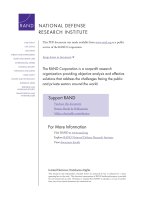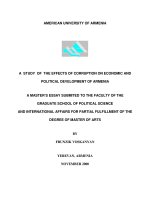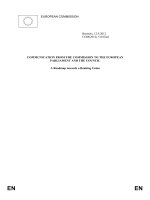TO THE EUROPEAN PARLIAMENT, THE COUNCIL, THE EUROPEAN ECONOMIC AND SOCIAL COMMITTEE AND THE COMMITTEE OF THE REGIONS pdf
Bạn đang xem bản rút gọn của tài liệu. Xem và tải ngay bản đầy đủ của tài liệu tại đây (88.54 KB, 11 trang )
EN EN
EUROPEAN
COMMISSION
Strasbourg, 23.10.2012
COM(2012) 629 final
Vol. 1/2
COMMUNICATION FROM THE COMMISSION
TO THE EUROPEAN PARLIAMENT, THE COUNCIL, THE EUROPEAN
ECONOMIC AND SOCIAL COMMITTEE AND THE COMMITTEE OF THE
REGIONS
Commission Work Pro
g
ramme 2013
2
Today's absolute imperative is to tackle the economic crisis and put the EU back on the road
to sustainable growth. This is the number one task for this generation of Europeans. It calls
for a Europe able to compete in the global economy, reshaped to seize the opportunities of the
future. It requires the stable macroeconomic environment which true economic and monetary
union can bring. It needs a step change in the economy, to release the many strengths Europe
can bring to bear in tomorrow's economy of high innovation and high skills. This demands
changes to the business environment in the Single Market; it requires that the huge potential
of Europe's networks and of the IT revolution is fully exploited; it calls for new skills and
help so that those shut out of the labour market today can make their contribution; and it must
be shaped by the needs and opportunities of resource efficiency. These are long-term
challenges calling for a concerted effort from all sections of society – but in all cases, the EU
contribution is a precondition for success.
This is why, in the State of the Union address, President Barroso called for new thinking for
Europe – to draw the consequences of the challenges we are now facing and that are
fundamentally changing our world. There can be no growth without reform and no way of
confronting our challenges unless we do it together. The State of the Union speech launched
ambitious ideas for the long term framing of the EU – a deep and genuine economic union,
based on a political union. This vision must be translated into practice through concrete steps,
if it is to address the lingering crisis that continues to engulf Europe, and the Euro Area in
particular.
This 2013 Work Programme sets out the long term vision of what the EU might look like in
key policy areas, summarises what is missing today and explains how the Commission will
tackle these challenges. By prioritising the right kind of initiatives, the EU can contribute to
growth and job creation and can step by step move closer to its longer term vision.
The Commission has already tabled a wide range of growth enhancing proposals which are
now being negotiated by the co-legislators. Timely adoption and full implementation of these
measures would send a crucial signal of confidence to citizens and to investors, helping to
reinvigorate economic activity and stimulating much needed job creation. It would add up to a
major record of EU action before the June 2014 European Parliament elections. In 2013 the
Commission will devote much effort to implementation as an immediate way of delivering on
the benefits of EU action. Following the decisions to be taken on the multi-annual financial
framework by the end of 2012, during 2013 the Commission will focus on finalising
arrangements for rapid implementation, including through the use of country-specific
negotiation mandates to ensure that the priorities supported through EU-funded investment
are clearly targeted on growth and jobs. Targeted investment supported by a modern, pro-
reform EU budget can make a decisive contribution to growth, jobs and competitiveness.
The proposals in this work programme will be tabled during 2013 and in the first part of 2014,
bearing in mind the end of the current legislature. In the following sections some of the key
action is highlighted to show how the Commission will contribute to filling in the gaps
between the EU's objectives and the current situation. Annex I contains a more detailed list of
the proposals the Commission intends to propose in 2013/14.
3
Getting the foundations right: towards genuine Economic and Monetary Union
The objective
Europe's strength lies in the interconnection of our economies. The single market and the
common currency have driven this forward, and the integrated economic policy making at the
European level through the European semester is now drawing our economies together as
never before. However, the crisis has shown that the single market for financial services can
only deliver financial stability, economic growth and jobs if it is matched with a strong single
regulatory and supervisory authority at EU level. The next step must be to deepen economic
and monetary union with a fully-functioning banking and fiscal union.
What is missing today?
A genuine EMU needs a comprehensive approach to tackle the vicious circle of excessive
private sector indebtedness, unsustainable sovereign debt and banking sector weakness. The
EU lacks a global framework which fills in the gaps in a fully integrated financial services
policy, with a single supervisory mechanism for banks and a single rule book to govern all
financial institutions. It also needs to complete and implement the more effective mechanisms
put forward to prevent and correct unsustainable fiscal policies and economic imbalances.
Better coordination of tax policies will also be crucial. The progress made through the
European semester has also not yet reached its potential in terms of carrying through
recommendations into structural reforms in the EU.
While not yet complete, our economic governance has already been thoroughly reinforced
through the Europe 2020 Strategy, the European Semester, and the implementation of the Six-
Pack legislation. Agreement on the Two-Pack legislation is urgent in order to complete
further the economic governance. In 2013 the Commission will:
• Launch the fourth European Semester through the Annual Growth Survey;
• Follow up on the blueprint for a comprehensive and genuine EMU which it will
publish before the end of 2012;
• Propose additional legislation to further enhance stability, transparency and consumer
protection in the financial sector (for example, on the systemic risks related to non-
banks and shadow banking).
The legislation already in place and now being considered adds up to a fundamental reshaping
of the EU's financial system. Agreement on banking supervision will put the European
financial system on far more secure foundations and act as a springboard for confidence. 2013
will see the implementation of many of the detailed rules of this package. The same is true for
cohesion policy, where the key priorities for growth-enhancing measures and structural
reforms brought out in the European semester will be put at the core of new national and
regional programmes and where the focus will be on the finalisation of the country-specific
mandates for the next generation of structural funds. The Commission will also take action to
fight tax fraud and evasion, including an initiative on tax havens, bringing the EU dimension
to bear on national efforts to consolidate public finances.
4
Boosting competitiveness through the Single Market and industrial policy
The objective
Sustainable growth and job creation need to combine a stable macro-economic environment
with the ability to compete in the global economy. Europe has strengths which can give it a
competitive edge through a modernised social market economy and can help it to take the lead
in the new industrial revolution. The Single Market and fair competition can come together
with targeted investment and the right approach to entrepreneurship to exploit the
opportunities for growth through new technologies and innovation.
What is missing today?
The Single Market needs to continue to adapt to reach the potential for businesses and
consumers in a borderless Europe. Technological change offers huge possibilities, but it needs
to be accompanied by new approaches in areas like procurement, standards, and intellectual
property. The EU needs a long-term framework for energy and climate policies so that
investment and policy target competitiveness and tackle climate change. Europe falls short on
innovation, with obstacles to building new markets and investing in the technologies that will
change the way we live, as well as wider issues of attitudes to entrepreneurship and business
failure. It also needs the right legal framework to move Galileo towards commercial
operations. This is exacerbated by the problems faced by companies, in particular SMEs, in
accessing finance in the wake of the crisis, as well as the unnecessary costs of administrative
burdens and the impact of some outdated public administrations. Shortcomings in
implementation also hold back the full benefits.
The recent Single Market Act-II set out 12 new concrete priority actions, to reenergise the
Single Market around four main drivers: networks, mobility, the digital economy and
cohesion.
1
Following up on its 2012 Communication on a new industrial policy
2
, the
Commission will take a fresh look at the single market for products, which makes up 75% of
intra-EU trade. These actions follow on the priority actions under the first phase of the Single
Market Act
3
, which now need to be agreed quickly. The Commission will work hard with the
co-legislators in 2013 to bring these proposals to fruition and full and effective
implementation. Key proposals will include:
• Initiatives to align rules and cut the costs of VAT compliance through a single
declaration;
• A legislative proposal to make e-invoicing mandatory for public procurement will
facilitate business-to-government interaction, reduce costs and serve as a pilot for
other sectors;
• Initiatives to update and simplify the rules for the circulation of products in the single
market, and identify gaps still blocking free circulation, as well as intensified work on
standards, certification and labels;
1
COM(2012) 573 of 3 October 2012
2
COM (2012) 582 of 10 October 2012
3
COM(2011) 206 of 13 April 2011
5
• As part of Horizon 2020, 2013 will see proposals to launch and develop a range of
major public-private partnerships to bring private and public investment together with
the EU budget to drive a common approach to key strategic sectors like
pharmaceuticals, air traffic management and nanotechnology, leveraging some €9-10
billion in new investment;
• Initiative on energy technologies and innovation to deliver a sustainable, secure and
competitive energy system;
• Proposing a series of major reforms to modernise state aid;
• Modernise our approach to intellectual property rights to ensure that it is effective and
consumer-friendly in the digital world.
Energy efficiency is a key area for competitiveness. The Commission will reinforce its
cooperation with Member States on the implementation of the energy efficiency directive, the
energy labelling and ecodesign legislation. Implementing the strategy for Key Enabling
Technologies will also be a key lever of competitiveness. The Commission will deepen its
work to help SMEs facing the challenge of financing and implement the Action Plan for
entrepreneurship. Support from the European Regional Development Fund and the COSME
4
programme will be ready to roll out when the new financing period starts in 2014. New
programming of the European Social Fund will also include a particular focus on the
provision of skills necessary for successful transition from school to work and for increasing
employability of the workforce.
Connect to Compete: Building tomorrow's networks today
The objective
A fully integrated and interconnected European Single Market covering telecoms, energy and
transport is a prerequisite for competitiveness, jobs and growth. Achieving this requires
affordable, accessible, efficient and secure network infrastructure. Accelerating the roll out of
the digital economy will bring benefits across all sectors, through enhanced productivity,
efficiency and innovation. Europe must have state-of-the-art digital networks to retain and
build its global competitive position, to be able to handle the explosion in internet use and
exchange of data and to fully exploit the efficiency gains and innovative services allowed by
major online developments. In energy, significant investments in electricity grids and other
energy networks will help make energy supplies more secure, sustainable and competitive. On
transport, a fully integrated single market and more efficient networks allowing to switch
easily between different modes, would bring huge benefits to citizens and companies,
including in urban areas.
What is missing today?
National approaches and a variety of barriers hold back competitiveness and prevent the
exploitation of networks on a European scale. Investment is not sufficiently galvanised to
support projects which will be the bedrock of Europe's future prosperity and is held back by
shortcomings in the regulatory environment. This also holds back the potential for innovation
in areas like smart grids and meters, and intelligent transport. A lack of interoperability
4
Programme for the Competitiveness of enterprises and SMEs 2014-2020
6
increases costs and holds back the level playing field. Gaps in the regulatory framework hold
back business investment and consumer confidence in key areas like payments. Gaps in
infrastructure create extra costs and inefficiencies for energy consumers, delay modernisation
of logistics, and prevent the full exploitation of broadband.
In order to continue to fill in the missing links in 2013/14, the Commission will make
proposals to:
• Modernise Europe's transport and logistics to help companies save time and energy, as
well as reduce emissions, through proposals on rail and freight transport, goods traffic
between EU ports, and the Single European Sky;
• Tackle the obstacles to electronic payments;
• Support investment in high speed networks;
• Boost the coverage and capacity of broadband by reducing the cost of its deployment
and freeing up band width for wireless broadband.
Alongside cohesion policy, the Connecting Europe Facility
5
will be one of the EU's most
obvious contributions to cutting through these obstacles by stimulating infrastructure. 2013
should see the facility up and running and key choices made on targeting. It should also see
project bonds being rolled out to help harness private sector investment.
This will go hand in hand with consolidating regulation. More needs to be done to achieve a
true European transport area with European rules: proposals on connecting up in the rail
sector and on accelerating the implementation of the Single European Sky should be taken
forward as priorities. In the field of energy, the latest phase of liberalisation towards the
completion of the internal energy market by 2014 must be driven through to make Europe's
future energy supply sustainable, competitive and secure. A new framework for national
interventions in the energy sector will be a core element to ensure that adequate investments
are made and that market interventions are necessary and proportionate.
Growth for jobs: Inclusion and excellence
The objective
Through its capacity to combine growth and inclusiveness, our social market economy is one
of Europe's greatest assets. But today its economy and its society face the threat that the grave
problems of high unemployment, increased poverty and social exclusion risk becoming
structural. The EU dimension must be harnessed to assist Member States to find every
opportunity to help people looking for work and to address the mismatch between labour
supply and demand. This starts with an active employment policy to help them to have the
right skills to be employed and which uses the potential of mobility to the full. The goal
should be to find innovative ways to increase educational attainment and labour market
participation. Adequate and sustainable social policies and more accessible social services are
needed to promote social inclusion and entry into the labour market. The job creation
potential of key growth sectors, such as the green economy, ICT and health and social care
sectors needs to be fully tapped. To maintain its workforce in the longer term perspective of
5
COM(2011) 0665 of 19 October 2011
7
an ageing society, European labour markets need to be inclusive, mobilising employees of all
ages and at all level of qualifications.
What is missing today?
Public employment services and employers face a major challenge with the scale of
unemployment in Europe, in particular among young persons. To boost the employability
levels is key to re-launch growth, taking also into consideration vulnerable groups. The
potential for job creation in sectors such as the green economy, ICT, health and is not fully
exploited. Education and training systems are not keeping up with changing labour market
needs – resulting in shortages in key areas like science, mathematics and e-skills. Higher
education is not sufficiently connected to research and innovation activities and is slow to
build capacity in areas like ICT – which both reflects and contributes to a lack of
internationalisation. Life-long learning is still developing, and public policy and business
practices do not reflect the need for older workers to extend their working careers. Undeclared
work creates an extra challenge. Social protection and social investment should be more
effective. Vulnerable groups find it particularly difficult to get into or to return to the labour
market. And the potential for labour mobility to fill gaps is held back by problems in the
recognition of qualifications, documentation and skills across Member States.
Supporting Member States' policies on employment and job creation is one of the highest
priorities of the European semester. The Commission will continue in 2013 to work actively
with Member States and social partners, in particular on the basis of the youth guarantee and
traineeship initiatives to be set out later this autumn. In order to continue to fill in the missing
links in 2013/14, the Commission will make proposals to:
• Help improve the performance of public employment services and networking
between national employment agencies;
• Harness social investment for inclusive growth, through guidance for policy reforms
identified in the framework of European semester, supported by the EU funds such as
the European Social Fund;
• Furthering the internationalisation efforts of higher education, to prepare Europeans
for an increasingly global, open and competitive labour market;
• Put in place the right framework for the institutions handling occupational pensions.
Obstacles to mobility remain one of the main lost opportunities of the Single Market.
Adoption and implementation of the revision of the Professional Qualifications Directive
6
will
be an important step to open up professions. Work should continue to examine and reduce
unnecessary restrictions for regulated professions limiting the ability of professionals to work
in another Member State.
Preparing the new generation of programmes under the European Social Fund will be a major
goal for 2013, to ensure that this brings the quickest and most effective support to the
modernisation of labour market policies and social inclusion policies, strengthening of
education and lifelong learning systems, to ensure that groups like young and long-term
unemployed have the right skills for the jobs of the future. A wide range of EU programmes
6
COM (2011) 883 final
8
will contribute to these goals, including the European Regional Development Fund, Horizon
2020 and Erasmus for all.
Using Europe's resources to compete better
The objective
Competitiveness today must be geared to competitiveness tomorrow. There is untapped
potential for the EU economy to be more innovative, productive and competitive whilst using
fewer resources and reducing environmental damage. Less waste should be produced and
more re-used and recycled in line with the practice of the best performing Member States.
Greater resource efficiency would contribute to growth, jobs and enhanced competitiveness,
with reduced costs for business as well as significant benefits for health and the environment,
lower greenhouse gas emissions, contained energy bills and new opportunities created for
innovation and investment. The EU is particularly well-placed to give policy the long-term
dimension required.
What is missing today?
European society and the European economy do not yet exploit the full potential for resource
efficiency. Much recyclable waste is either exported or sent to landfill. A lack of long-term
frameworks holds back planning and investment, most obviously on a climate and energy
framework beyond 2020, but also on long term sustainable use of key resources such as air,
soil, energy, water, fish and biomass. At the same time, such frameworks can help to
galvanise the innovation needed to exploit the potential of the transition to a low-carbon
economy in areas like transport, energy and agriculture.
In order to continue to fill in the missing links in 2013/14 the Commission will make
proposals to:
• Provide a long-term perspective on how the EU will move ahead from its 2020 targets
to continue the trajectory towards a low-carbon economy through a comprehensive
framework for the period to 2030;
• Frame a new strategy on adaptation to climate change to make Europe more resilient;
• Review the waste legislation, to look at how new markets and better recycling can
contribute to growth;
• Adapt the EU policy framework for air quality.
At the same time, the finalisation of the new generation of agriculture and fisheries policies
and regional and rural development programmes will maximise the opportunity to bring
together innovation and job creation with a focus on sustainability. The promotion of a
resource efficient "blue economy" will help to release the potential of Europe's maritime areas
to contribute to growth. 2013 will also bring the start of the 3
rd
phase of the EU Emission
Trading System (2013-2020).
9
Building a safe and secure Europe
The objective
The EU needs to protect its citizens and their rights from threats and challenges and further
remove obstacles to circulation of citizens in Europe. This includes fighting crime and
corruption, controlling our external borders and ensuring the respect of the rule of law and of
fundamental rights, with the right balance between security and mobility. It also needs a well
functioning and efficient justice system to support growth, entrepreneurship and attract
investors. Equally, the EU works to proactively reduce risks to health, food and product
safety, critical infrastructures and disasters. Safe and sustainable use of nuclear energy is a
key element.
What is missing today?
Threats to safety and security evolve, and the EU's response needs to reflect this by using
technology to tackle safety in food or nuclear energy, by working for the swiftest and most
effective disaster response and by deepening cooperation in tackling the increasing cross-
border dimension of crime. Areas like terrorist financing and the cross border traffic in
weapons need particular attention. The EU has a particular responsibility to protect its own
financial interests against fraud and corruption, but lacks the full institutional framework
required. Mutual trust in areas of safety, security and justice needs to be earned, and the
networks and exchanges needed to build this are not always present.
Vigilance is also needed to ensure that the fundamental rights of citizens in the EU are
protected in full. If people and businesses are to take full advantage of their rights, they need
easy access to justice, on equal terms in all countries in cases of cross-border litigation.
The Commission will make proposals to continue to fill in the missing links:
• Establish a European Public Prosecutor's Office to fight against crimes affecting the
EU budget and protect its financial interests;
• Fight traffic in firearms;
• Improve judicial cooperation in both criminal and civil matters;
• Revise legislation on nuclear safety and propose new legislation on nuclear insurance
and liability;
• With 2013 marked as the European Year of Citizens, the Citizenship Report will
review progress in ensuring that EU citizens can readily exercise their rights and
identify future action.
The Commission will also implement a variety of important initiatives to promote a virtuous
circle of cooperation between national administrations and judicial systems. The ongoing
work of the Consumer Protection Cooperation network of enforcement authorities is a core
tool for practical enforcement. The first anti-corruption report and the first judicial scoreboard
will both offer new tools to encourage best practice to be identified and pursued. Agreement
on new arrangements for Schengen governance would also give Member States an important
new tool to consolidate mutual confidence in common control of borders. Efforts to reinforce
application of existing solidarity mechanisms in immigration will be continued.
10
Pulling our weight: Europe as a global actor
The objective
The EU's interests and commitment to values of democracy, the rule of law and human rights
depend heavily on what happens beyond its borders. Promoting our values in our immediate
neighbourhood and beyond is a priority, by building partnerships with third countries and
promoting multilateral solutions to common problems.
Collectively, the EU is the largest donor of funds for development cooperation, climate
finance and humanitarian aid in the world. We are also the world's largest trading partner.
When we can deploy the Union's and Member States' resources in an effective and consistent
way beyond our borders, and bring together the wide range of instruments available, the EU
can have greater impact and influence on the world around us. This helps to deliver the goals
of growth, stability and democracy and to meet the goals of policies like tackling poverty and
boosting peace and security, as well as pursuing policies like addressing climate change, the
environment, transport and energy, and optimising the opportunities for international
cooperation in areas such as science and technology. In the year of Croatia's accession, the
enlargement process and the neighbourhood strategy continue to provide key tools to support
positive change in partners on the EU's doorstep.
What is missing today?
On the global stage the EU is a key actor; but more can be done to develop a truly unified
approach using different strands of policy and different instruments to reinforce each other.
The EU should also ensure closer monitoring of the implementation of its commitments,
notably as part of the support provided to countries in transition in its neighbourhood.
The external dimension is integral to promoting growth and competitiveness in 2013 and
beyond. The EU is pursuing a bilateral trade and investment agenda of unprecedented
ambition to complement its efforts at the multilateral level. Negotiations are close to
conclusion with such important partners as Canada, Singapore and India, and will hopefully
soon be launched with Japan. The final recommendations of the EU-US High Level Group on
Jobs and Growth may also pave the way for negotiations on an ambitious and comprehensive
transatlantic partnership. Japan and the United States are such key partners that successful
agreements with these two countries could add 1-1½% to EU GDP and create almost a
million jobs. Such agreements would support multilateral liberalisation and regulatory
dialogue, and open new markets for European products and services. Scoping exercises with
other partners are currently being conducted.
2013 will see a particular focus on consolidating the rule of law firmly at the centre of
enlargement policy, consolidating economic and financial stability and promoting good
neighbourly relations and closer regional cooperation in areas like trade, energy and transport.
Neighbourhood policy will continue to centre on an incentive driven approach, where EU
support for reforms follows a clear progress in building democracy and the respect of human
rights. Priorities in 2013 will be the 'Deep and Comprehensive Free Trade Areas', mobility
partnerships and visa facilitation.
The EU has responded to the rapid change in our neighbourhood through the framework of
the revised European Neighbourhood Policy, consolidating the Eastern partnership and
11
launching a partnership for shared democracy and prosperity with the Southern neighbours.
Our focus in 2013 with our Southern neighbours will be on implementation and delivery,
using innovative ways to mobilise political and economic resources to mutual benefit.
As the Millennium Development Goals (MDG) Summit approaches in 2015, the EU is
working to fulfil its commitments on development assistance, as well as pursuing specific
goals of sustainable growth and resilience in the face of crisis. It also continues to pursue key
negotiations such as reaching a new international climate agreement by 2015. At the same
time, as the new generation of external action instruments is finalised, 2013 will be a key year
for ensuring that the EU's new development policy orientation – the Agenda for Change
7
- is
mainstreamed throughout our relationship with our partners, with a new focus on good
governance, inclusive and sustainable growth and stimulating investment in developing
countries. It will also see further steps in ensuring an effective and swift crisis response
capacity and developing a comprehensive response to crisis prevention, management and
resolution.
In order to continue to fill in the missing links in 2013/14 the Commission will make
proposals to:
• Assuming success in ongoing scoping exercises and in current preliminary
discussions, propose negotiating directives for comprehensive trade and investment
agreements with relevant partners;
• Put forward coherent EU positions bringing together the Millennium Development
Goals, the post-2015 development agenda and Rio+20.
7
COM(2011) 637 of 13 October 2011









